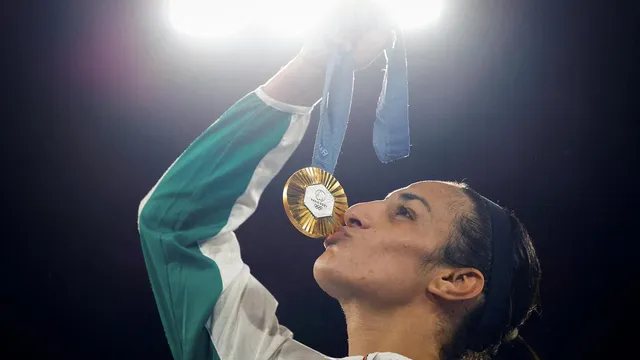
Imane Khelif vows to defend Olympic gold amid controversy
2025-03-20 12:50- Imane Khelif, the Algerian boxer, won gold in boxing at the Paris Olympics amidst a gender-eligibility controversy.
- She plans to defend her title at the 2028 Los Angeles Games and stated she is not intimidated by President Trump's comments.
- Khelif aims to maintain focus on her Olympic goals despite the ongoing public debate surrounding gender in sports.
Express your sentiment!
Insights
Algerian boxer Imane Khelif, who won gold at the Paris Olympics, faces a gender-eligibility controversy but remains focused on her goal of defending her title at the Los Angeles Olympics in 2028. Following her victory in Paris, Khelif has been subjected to criticism, including accusations from President Donald Trump, who claimed she is transgender and labeled her a ‘male boxer’. In response, Khelif assertively stated that she identifies as a woman and is not intimidated by the political discourse surrounding gender in sports. The International Boxing Association, which disqualified Khelif at the 2023 world championships due to gender eligibility concerns, has lost its recognition from the International Olympic Committee (IOC) amid governance issues. Instead, the IOC has recommended World Boxing as the governing body for the sport, indicating a possible path towards clearer gender eligibility regulations in the future. Khelif hopes that upcoming changes from World Boxing will provide a fair framework for all athletes. Khelif’s achievements in the ring have ignited important discussions about the inclusion of transgender athletes and those with Differences of Sexual Development (DSD) in women’s sports. These debates have created significant tension, not only within the sports community but also on a broader social and political level, with public figures like Trump and others weighing in on the matter. Khelif’s gold medal win has made her a polarizing figure, which has contributed to the ongoing discourse about identity and gender in athletic competition. Despite the pressure and scrutiny, Khelif remains resolute in her commitment to win another gold medal in Los Angeles. She expressed her determination, stating that she is more motivated than ever to compete. As she prepares for the upcoming games, Khelif hopes that the next IOC president will prioritize true sportsmanship and uphold the core values of the Olympic spirit. As gender eligibility issues continue to evolve, they will undoubtedly play a critical role in the world of sports, influencing not only regulations but also the experiences of athletes like Khelif.
Contexts
The topic of transgender athletes in sports has emerged as a significant issue within U.S. policy discourse, particularly with the implementation of executive orders aimed at regulating participation based on gender identity. This report examines the implications of such orders and the ongoing debates surrounding them, particularly in the context of fairness, inclusion, and discrimination. As of March 2025, various states have enacted laws that either restrict or support transgender athletes' participation in sports, leading to a patchwork of regulations that can often conflict with one another. The executive order on transgender sports seeks to provide federal standards but has faced legal challenges and strong societal reactions throughout its implementation. Supporters of inclusive policies argue that participation in sports is a fundamental right that should not be denied based on an individual's gender identity. They contend that allowing transgender athletes to compete according to their identified gender is crucial for both their mental well-being and their overall societal acceptance. This perspective is supported by findings from various organizations, which highlight that sports participation fosters self-esteem, community belonging, and resilience among young people, especially among marginalized groups. Furthermore, many advocates assert that prohibiting transgender athletes from competing alongside their peers constitutes a violation of their civil rights. On the other side of the debate, critics often raise concerns regarding the fairness of competition. They argue that physiological differences, particularly relating to testosterone levels and male puberty, may confer undue advantages to transgender women (assigned male at birth) in certain competitive contexts. This perspective has led to a call for scientific studies and sports governing bodies to re-evaluate existing policies. Various sports organizations, including the NCAA and Olympic committees, are wrestling with crafting inclusive but fair participation guidelines that consider both competitive integrity and inclusivity, resulting in ongoing dialogue and research. This evolving landscape indicates that the issue of transgender athletes in sports will continue to be a focal point in American society. As legal battles ensue and public opinion shifts, policymakers and sports regulators must balance the rights of transgender individuals with the objective of maintaining a fair competitive environment. The implications of these decisions extend beyond sports, touching upon fundamental societal issues of equality, identity, and acceptance. The discourse surrounding this topic is far from settled and reflects broader cultural conversations about gender, rights, and the nature of competition itself.